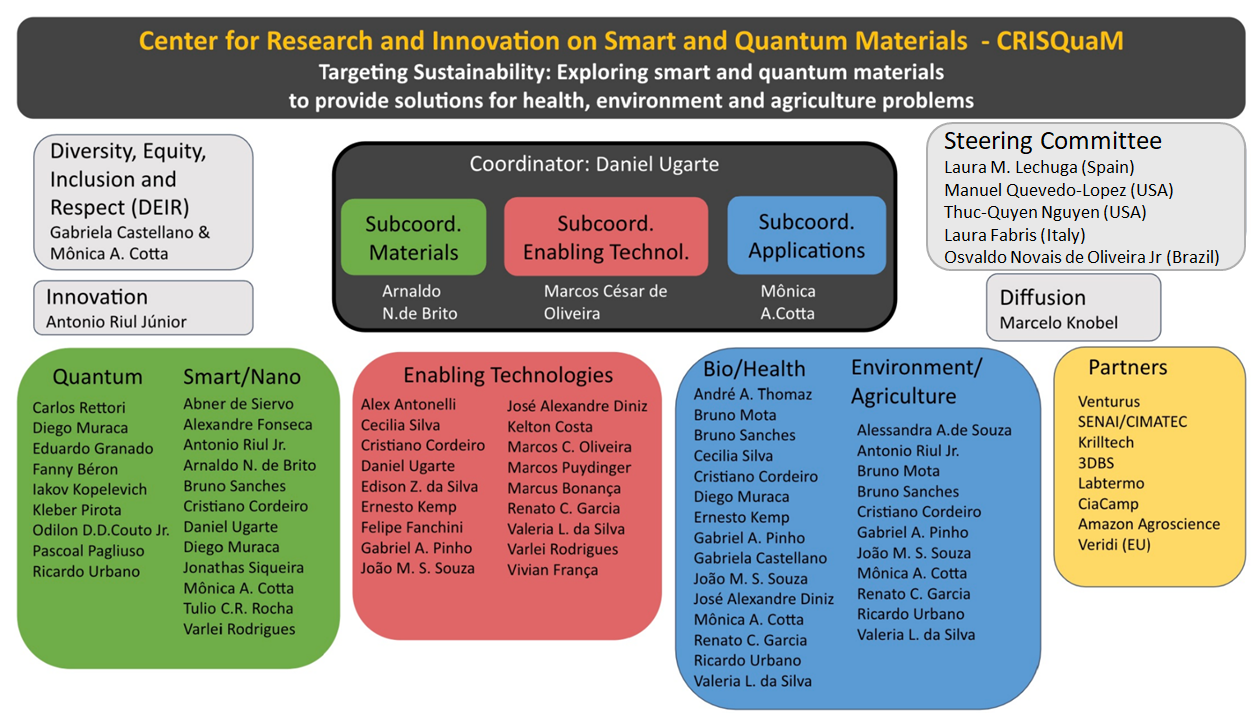BV-FAPESP: research projects supported in this Center
CRISQuaM in the Media: news about the center
CRISQuaM aims to explore the synergistic development of fundamental and applied science to create new materials with high potential for the construction of devices and sensors to address technological challenges related to sustainability, climate change, precision agriculture, ecology, and health. To achieve these goals, we have assembled an interdisciplinary and collaborative research team, integrating expertise across various scientific domains, researching novel materials with high innovation potential. By combining original synthesis methods, advanced characterization techniques, theoretical approaches, computational simulations, quantum technologies, and device construction designs, we aim to drive advances in smart and quantum materials, promoting scientific excellence and technological development. With this, we plan disruptive innovations in instrumentation—including hardware and AI-based tools—as well as in quantum technologies, biomedical devices, and signal processing, in addition to plant bionics, exploring plant-pathogen interactions. Besides research activities, we plan intensive actions in education, dissemination, and communication for the general public, as a modern society should be aware of the challenges humanity faces and how research and technology are essential for responsibly utilizing the planet's limited resources. CRISQuaM's Innovation activities are accelerated through partnerships with several companies in related technologies, many of them Brazilian. Finally, all activities of the Center are managed in accordance with diversity, equity, and inclusion goals and best practices.
The Center brings together scientists, engineers, and innovators in a collaborative effort to apply materials science and quantum technologies at the cutting edge, designing new materials and nano(bio)sensors for advanced diagnostics. The Center has a team capable of producing a wide range of (nano/micro) materials, along with precise chemical and physical characterizations using modern techniques (synchrotron, advanced microscopy, magnetotransport, magnetic resonance, optics, etc.). In addition, the team offers various options in enabling technologies, including miniaturization, processing, and additive manufacturing, as well as instrumentation, quantum sensing, and electronics development. Data analysis will employ updated approaches (numerical simulation, classical and quantum machine learning, and quantum optimization). Applications at the knowledge frontier will address urgent sustainability needs in environmental areas, precision agriculture, plant bionics, and biomedical interfaces, contributing to the development of local technologies in close partnership with the Brazilian industry.
The organization of the Center is based on three pillars — Materials, Enabling Technologies, and Applications — together with partner companies, as described in the figure below.

2025-06-27
A yeast experiment conducted at a FAPESP-supported research center shows how deficiencies in the proteasome, which is responsible for eliminating damaged and non-functional proteins, affect the metabolism of mitochondria, the organelles that generate energy for cells.
2025-06-25
Blood and urine analyses of the population living in the Mundaú lagoon complex revealed a greater presence of chemical contaminants and metabolic alterations that can exacerbate chronic diseases, such as diabetes and hypertension. These results underscore the need to monitor the health of the inhabitants and control the sources of contamination.
2025-06-25
By analyzing patient samples, Brazilian researchers identified the species Fusobacterium nucleatum in nearly 60% of cases, with a higher prevalence in oropharyngeal tumors. This microorganism has also been associated with the development of colorectal cancer.
2025-06-25
An experiment conducted at the State University of Campinas showed that FGF19, produced in the intestine, acts on specific regions of the brain, causing the body to burn energy to produce heat; the discovery paves the way for new drugs.
2025-06-24
An experiment carried out by researchers from São Paulo State University on zucchini crops indicated that a 30% drop in rainfall would reduce the availability of calories in the sweet liquid that serves as food for pollinators, such as bees, by 34%, while extreme drought practically wipes out the resource. These results are particularly concerning for plants that depend on cross-pollination.
2025-06-23
In animal tests, the molecule developed in South America has been shown to prevent fat accumulation and treat existing obesity and associated metabolic disorders. Initial human studies have confirmed the safety of the compound.